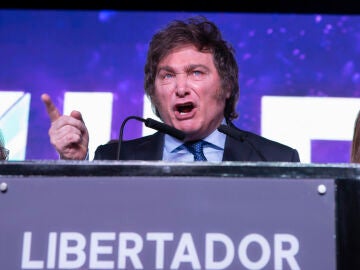
The far right javier milei has become the precandidate with the most votes in the primary elections in Argentina, some elections in which the experts predicted a scenario where the votes would be divided into three thirds. With almost seven million votes, the libertarian economist, leader of the La Libertad Avanza party, has capitalized on the discontent vote of Argentine society and has been the most voted among the candidates for the Presidency for next October 22.
However, as the scrutiny progressed, the advantage of his team, winner with a 30.17% of the votes, over the other two parties with the most votes: the main opposition coalition, Juntos por el Cambio, of the center right, with a 28.25% of the vote; and the official Unión por la Patria (Peronist), with a 27.15%.
The PASO elections (primary, open, simultaneous and mandatory) held this Sunday in the Latin American country leave the former Minister of Security in the Government of Mauricio Macri, Patricia Bullrich, on the launching pad to try to become the third president of the country, after María Estela Martínez de Perón and Cristina Fernández. The candidate has prevailed in the internal opposition to the mayor of Buenos Aires, Horacio Rodríguez Larreta, by more than 1.4 million votes.
Although the third force with the most votes was Unión por la Patria, the one who will be a candidate for the Presidency, the current Minister of Economy, Sergio Massa, has come behind Milei with almost five million votes, one million more than Bullrich. Although he competed with the social leader Juan Grabois -who obtained 1.3 million votes-, Massa has been the consensus candidate among the different families of Peronism: the sector aligned with President Alberto Fernández, the wing that responds to Vice President Cristina Fernández and the Renewal Front itself led by Massa.
Despite the socioeconomic circumstances that Argentina is going through, with almost 116% year-on-year inflation, close to half of the population living in poverty and an exchange rate gap close to 110%, Peronism has obtained greater support than expectedwhile Together for Change has fallen well below the 35% that many ventured.
In addition to Milei, Bullrich and Massa, the non-Kirchnerist Peronist Juan Schiaretti -with whom Rodríguez Larreta tried to form an alliance to integrate his candidacy, which cost him much internal criticism- and the candidate of the Left Front and Workers Myriam Bregman.
The stake in these primary elections has been 69.62%, almost seven points less than in those of 2019, when 76.4% of the census was reached. Some 35.4 million Argentines were called to the polls to define the lists of candidates who would be qualified to compete in the general elections, in which they will elect president and vice president, renew 130 of the 257 seats in the Chamber of Deputies and 24 in the 72 seats in the Senate, as well as 43 Argentine representatives for the Mercosur Parliament.
In this context, Peronism has managed to retain its great bastion electoral, the province of Buenos Aires, the most populous district in the register, with 36.37% of the votes for the current governor, Axel Kicillof, the only candidate for the ruling party. As for the city of Buenos Aires, the Pro’s candidate, Jorge Macri, cousin of former president Mauricio Macri, won the Juntos por el Cambio internship against the radical Martín Lousteau, who had the support of Rodríguez Larreta.
Now, Argentina begins the presidential race that will culminate on October 22. If none of the candidates achieves an absolute majority in that first round, the two most voted for will compete on November 19 for the term that will start on December 10 and end in 2027.
Source: Lasexta
Ricardo is a renowned author and journalist, known for his exceptional writing on top-news stories. He currently works as a writer at the 247 News Agency, where he is known for his ability to deliver breaking news and insightful analysis on the most pressing issues of the day.












